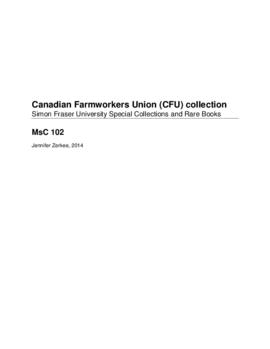Covering the time period from February 1942 to November 1943, the collection consists of records created or received by various staff of the Department of Mines and Resources, Surveys and Engineering Branch in the course of their activities establishing, administering and operating road work camps for evacuated male Japanese Canadian nationals along the proposed route of the Yellowhead Highway between Blue River, British Columbia and Jasper, Alberta. Also included among the files are some records of Department of Public Works staff pertaining to their role in the establishment of the camps, as well as a significant amount of correspondence with the British Columbia Security Commission (B.C.S.C) and related records. In addition to documenting the evacuation of Japanese Canadians from the B.C. coast to interior road work camps and other areas in early 1942, and many of the activities and events that occurred in the camps, the records also provide evidence of the economic and labour conditions in British Columbia during World War II.
Records within the collection pertain to the following road work camps: Albreda, Black Spur, Blacks Spit, Blue River, Gosnell, Grantbrook, Lampriere, Lucerne, Pratt, Pyramid, Rainbow, Red Pass, Red Sands, Tete Jaune / Yellowhead, and Thunder River in British Columbia, and Geikie, Jasper and Decoigne in Alberta. In addition, some records reference detention camps at Greenwood, Kaslo, Lemon Creek, New Denver, Roseberry, Sandon, and Slocan.
Record types include correspondence, reports, lists, nominal rolls, bills of lading, invoices, operational memos, purchase orders, and balance sheets. A significant number of records relate to the establishment and ongoing supply of the road work camps; these include supply orders and invoices, architectural plans for camp buildings, and status and other reports concerning the preparation of camps. Administrative personnel records document the hiring, management and activities of non-Japanese Canadian road camp workers, such as foremen, sub-foremen, and carpenters, and include information pertaining to the previous work and life experiences of these men, their age, ‘character,’ medical conditions, and home address, as well as positions and wages expected and received.
Many records within the fonds relate to the management of Japanese Canadian road camp workers, including the administration of pay, Workmens’ Compensation claims, and payment of assignment fees for dependents; medical and perceived psychological issues and the treatment of such issues; and the movement of Japanese Canadian men between camps and the policies and procedures governing these movements. This includes records pertaining to the granting of temporary leave, transfer to other camps or areas, family re-unification, the release of workers to private jobs, either within B.C. or in another province such as Ontario or Alberta, and the attitudes of certain communities towards Japanese Canadians. Correspondence in several files relates to supervisors’ attitudes towards road camp workers, including those identified as agitators or troublesome, and the methods used to deal with them, such as transfer out of camp and the censorship of Japanese Canadian mail. Included also are records relating to the organization and collective resistance of Japanese Canadian road camp workers, their demands, complaints and refusals to work, and the techniques identified to deal with these situations.
Several files include nominal roles and other lists of Japanese Canadian and other road camp workers, including some or all of the following personal information: name, registration number, occupation, previous work experience, age, place of birth, address, marital status, number of dependents, ‘physical defects’ and medical, dental or mental health issues. Some correspondence from Japanese Canadian road camp workers to camp administrators provides insight into their lives both in camp and prior to evacuation.
Canada. Department of Mines and Resources. Surveys and Engineering Branch.

